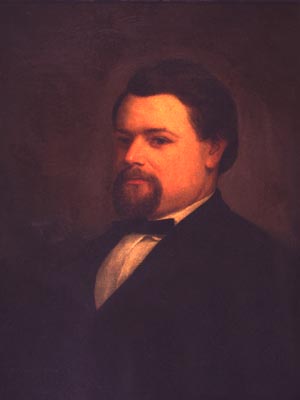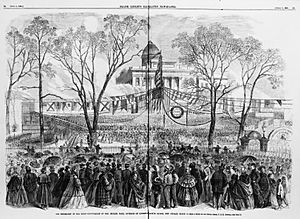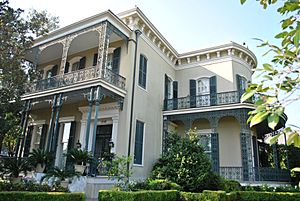Michael Hahn facts for kids
Quick facts for kids
Michael Hahn
|
|
|---|---|
 |
|
| 19th Governor of Louisiana | |
| In office March 4, 1864 – March 4, 1865 |
|
| Lieutenant | James M. Wells |
| Preceded by | Henry Watkins Allen (Confederate Governor) George F. Shepley |
| Succeeded by | James M. Wells |
| Member of the U. S. House of Representatives from Louisiana's 2nd congressional district | |
| In office December 3, 1862 – March 4, 1863 |
|
| Preceded by | Miles Taylor |
| Succeeded by | James Mann |
| Member of the U. S. House of Representatives from Louisiana's 2nd congressional district | |
| In office March 4, 1885 – March 15, 1886 |
|
| Preceded by | Ezekiel John Ellis |
| Succeeded by | Nathaniel Dick Wallace |
| Member of the Louisiana House of Representatives | |
| In office 1871-1878 |
|
| Personal details | |
| Born | November 24, 1830 Klingenmünster, Palatinate, Kingdom of Bavaria (now Rhineland-Palatinate) |
| Died | March 15, 1886 (aged 55) Washington, DC |
| Political party | Unionist, until 1863 Republican |
| Alma mater | Tulane University |
George Michael Decker Hahn (born November 24, 1830 – died March 15, 1886) was an important figure in Louisiana history. He was a lawyer, a politician, a newspaper owner, and a farmer. He lived in New Orleans, Louisiana.
Hahn served in the United States Congress twice. First, he was elected as a Unionist Democrat in 1862. Later, he was elected as a Republican to the U.S. Senate in 1865. He also served in the U.S. House of Representatives again in 1884.
He became the 19th Governor of Louisiana from 1864 to 1865. This was during the American Civil War, when Union troops controlled parts of the state. He was the first governor in the United States who was born in Germany. Some also say he was the first governor of Jewish heritage, though he practiced as an Episcopalian.
In 1865, Hahn was elected to the U.S. Senate. However, a group called the Radical Republicans did not let him or other Southern politicians join. Later, he served several terms in the state House during the Reconstruction era. He was even chosen as the Speaker of the House. Hahn also owned and ran three newspapers. These papers supported the Republican Party and its ideas. He spent a lot of his own money to keep these newspapers going. He was elected to Congress again in 1884 and served for about a year before he passed away.
Contents
Early Life and Education
Hahn was born in 1830 in Klingenmünster, a region called the Palatinate. At that time, it was part of the Kingdom of Bavaria. Today, it is in Rhineland-Palatinate, Germany. He was the youngest child in his family, and his father died before he was born. Some records suggest that Hahn's parents were Jewish.
When he was a child, Hahn moved to the United States with his widowed mother and four older brothers and sisters. They first arrived in New York City. Then, they traveled to the Republic of Texas before settling in New Orleans in 1840. The next year, Hahn's mother died from yellow fever, leaving the children without parents.
With help from his older siblings, Hahn continued his schooling. He graduated from City High School. In 1849, at age 19, he started studying law with Christian Roselius. Roselius was a well-known lawyer and later became the Attorney General of Louisiana. In 1851, Hahn earned his law degree from the University of Louisiana, which is now Tulane University. After getting his degree, he worked in Roselius's law office.
Political Beginnings
The year after he finished law school, Hahn was elected to the New Orleans city school board. He was only 22 years old and became the director of the school system. He joined a group within the Democratic Party. In the 1860 Presidential Election, Hahn supported Stephen A. Douglas. Hahn was good at speaking English, French, and German.
In 1860, Hahn was against the Southern states leaving the Union (secession). He gave a speech supporting the Union in Lafayette Square. He refused to promise loyalty to the Confederacy. Because he was against secession and supported the Union, Hahn was elected in 1862. He became a U.S. representative from Louisiana's 2nd congressional district. This area included most of New Orleans, which was then controlled by Union forces.
Hahn was one of two representatives from Louisiana allowed to serve in the 37th Congress during the Civil War. He later suggested that Louisiana should not have more representatives until it was "reconstructed" (rejoined the Union properly). While in Washington, Hahn met and became friends with President Abraham Lincoln.
Serving as Governor
In 1864, most of Louisiana was under federal control. General Nathaniel P. Banks, the Union military commander, called for state elections and a meeting to write a new state constitution. Other Unionists, Benjamin Franklin Flanders and Thomas Jefferson Durant, disagreed with General Banks's moderate plan.
Hahn bought a newspaper called the New Orleans True Delta. He used it to support Banks's moderate plan, which included freeing enslaved people. Hahn ran for Governor as part of the Free-State Party. He won the election with 54% of the votes.
Hahn became the first governor of an American state who was born in Germany. He is also considered the first governor of Jewish background in the United States, even though he was an Episcopalian at the time.

On March 4, 1864, Hahn officially became Governor of Union-controlled Louisiana. The ceremony was grand and paid for by General Banks. As governor, Hahn strongly supported universal education, meaning schooling for everyone.
During his time as governor, Hahn tried to give voting rights to freedmen (formerly enslaved people) and free people of color. However, it was too early for this to happen. He did approve Louisiana's agreement to the 15th Amendment, which later gave African American men the right to vote. Hahn's government worked hard to ensure black Louisianans could vote. He also started to create a public school system for black children.
Governor Hahn played a big role in the state's constitutional meeting in 1864. But he faced opposition from Major General Stephen A. Hurlbut. Hurlbut replaced Banks as commander and refused to recognize Hahn's civil government.
Hahn resigned as governor in March 1865. The state legislature then elected him to the U.S. Senate. However, the Radical Republicans in Congress did not allow him to take his seat. They felt Louisiana still needed more changes before fully rejoining the Union. Lieutenant Governor James Madison Wells became governor after Hahn resigned.
Newspaper Editor and Congressman
After President Abraham Lincoln was assassinated in April 1865, Congress refused to seat any representatives or senators from the Southern states. They wanted a plan for reconstruction to be completed first.
Senator-elect Hahn went back to New Orleans. He joined with radical Republicans who wanted to change Louisiana's 1864 Constitution to include voting rights for black citizens. In 1866, during a riot in New Orleans, he was shot and badly hurt.
In 1867, Hahn became the editor and manager of the New Orleans Republican newspaper. He used this newspaper to speak out against President Andrew Johnson's easy Reconstruction plan. In 1872, Hahn moved to a plantation in St. Charles Parish. There, he started a village called Hahnville and published his third newspaper, the St. Charles Herald. On his plantation, he grew sugar cane.
From 1871 to 1878, Hahn served in the Louisiana State Legislature. He was chosen to lead the Judiciary Committee and became the Speaker of the House. In 1878, he was appointed as the Superintendent of the U.S. Mint in New Orleans. He held this job until January 1879. Then, Hahn was appointed as a Judge for the 26th state judicial district. This district included Saint John the Baptist, Saint Charles, and Jefferson parishes. During the 1880 elections, Hahn started and edited another newspaper, the New Orleans Ledger, to support Republican candidates.
Even though Democrats had taken back control of the state government, people respected Hahn for his honesty and consistent beliefs. In 1884, Hahn was elected to Congress again. He ran as the Republican candidate from Louisiana's 2nd congressional district and won easily by 3,000 votes. He was the only Republican Congressman from Louisiana at the time.
Hahn passed away on March 15, 1886, in his room at the Willard Hotel in Washington, D.C.. He died from a ruptured blood vessel near his heart. His body was brought back to New Orleans.
An Episcopal priest led Hahn's funeral, and he was buried in New Orleans' Metairie Cemetery. He never married and died without much money. He had spent most of his wealth trying to keep his Republican-supporting newspapers running.
Images for kids
 | Ernest Everett Just |
 | Mary Jackson |
 | Emmett Chappelle |
 | Marie Maynard Daly |



